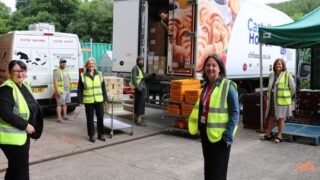The government must do more to help thousands of “hidden workers” who are being put under extra pressure or are seeing their health put at risk as a result of the coronavirus pandemic, says UNISON today (Tuesday).
Alongside the frontline health and care staff, there are people around the UK keeping essential services going, who are being largely forgotten as they too face serious dangers and are being overwhelmed with work, the union warns.
They include refuse collectors, housing officers, social workers and teaching assistants whose work must continue but who are often unable to keep a safe distance or not entitled to safety kit.
Some are handling more potentially hazardous waste or facing other daily problems such as an increase in abuse as a result of lockdown measures, says the union.
UNISON has written to communities secretary Robert Jenrick, asking for proper risk assessments for these workers and a wider distribution of protective equipment (PPE) to cope with the dangers they’re facing. But staff are still facing problems.
Among those facing added pressures according to UNISON are:
- Refuse workers, particularly those working for private contractors who are forced to sit in close contact in the cab. Some sensible employers have redeployed drivers to minibuses to take staff to their routes allowing correct social distancing.
- Crematorium and cemetery workers who’ve faced virus risks where families have refused to follow the limit on numbers at funerals. Some have also faced abuse when they’ve challenged groups congregating in cemeteries.
- Housing workers who run a wide range of risks. They deal with emergency situations such as domestic violence incidents, carry out emergency housing repairs and work with the homeless to get them into hostels and other accommodation.
- Trading standards staff who’re looking into hundreds of coronavirus scams and online ‘phishing’ attempts, as well as dealing with distressed older people who have been duped.
UNISON is calling for urgent talks with the government to discuss the concerns of these workers and help to tackle them. The union represents more than 600,000 staff working in local government or in outsourced services such as social care.
UNISON head of local government Jon Richards said: “It’s understandable that throughout the crisis, public attention has been focused on the UK’s health and care workers.
“But it’s important the government and the country as a whole don’t overlook the people providing vital services who also face added risks during the pandemic.
“We’re hearing day in and day out of the difficulties and dangers. People want to do all they can to get us through the crisis, but they’re worried and being made increasingly anxious by their working conditions.
“Ministers have to make sure the concerns of all essential workers are addressed. It’s also vital they show a commitment to underfunded local services by increasing budgets so local authorities can increase the pay offer they’ve made to council workers.”
Notes to editors:
– Examples of UNISON members who have raised concerns about safety during the pandemic include:
- Refuse collector
“We have concerns about government guidelines over distancing. It’s less than a metre from shoulder to shoulder in a cab. Also our people don’t feel safe doing their job because of the risks of contamination from old tissues, disposable gloves and the like.” - Teaching assistant
“We have no PPE to protect us at all. The smaller children don’t understand keeping a distance from anyone. The other day I had two upset reception children clinging to each side of me, and if you need to help them with personal needs, for instance if they wet themselves, then this definitely can’t be done at a distance. I’m not even sure about the effect of children passing something on to other children.” - Teaching assistant
“It is all too little, too late. PPE could have and should have been made available before the schools closed to non-key workers. Many school staff have become ill with the virus. We continue to go to work without any available protection and are in close contact with pupils whose parents are also key workers and therefore most at risk of catching and spreading the virus.” - Social worker
“PPE in children’s services is only available for home visits where it’s known that someone has COVID-19. But sometimes it may be unknown and the signs are not necessarily fever and cough (and there’s a five-day incubation period). We need PPE when we are seeing anyone who is unwell. Also, the recommendation is to wash your hands before entering and on leaving a home. But no hand gel or soap or wipes are provided to staff to enable this.”
– UNISON is the UK’s largest union, with more than 1.3 million members providing public services – in education, local government, the NHS, police service and energy. They are employed in the public, voluntary and private sectors.
Media contacts:
Anthony Barnes M: 07834 864794 E: a.barnes@unison.co.uk




